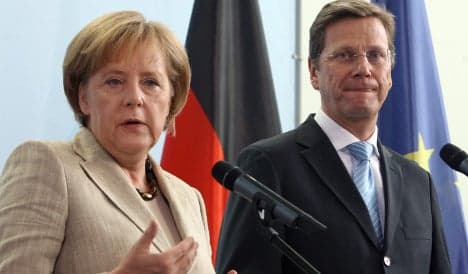D-Day arrives for Germany's budget

Germans are set to find out by lunchtime Monday the results of the cabinet’s brainstorming session on how to slash government spending by €51 billion over the next six years.
After an 11-hour session ending late last night, the cabinet was set to resume talks Monday morning, though a government spokesman said late Sunday night that “broad parts of the package are in place.”
The coalition government aimed to make the results of its budget meeting known by midday, the spokesman said.
The meeting aims to be a turning point for the government’s beleaguered finances. Some €11 billion would have to be cut from the 2011 budget, followed by €8 billion annually, in order to balance the 2016 budget, daily Bild reported.
The cabinet conclave plans to provide broad “concepts” for making savings, though the actual detailed budget won't be finalised until early July.
Over the weekend, media reports claimed the government plans to cut at least 10,000 civil servant jobs as well as allowing the work agency to decide how much to pay unemployed people.
Speaking Sunday, Chancellor Angela Merkel indicated that the axe was likely to fall on social benefits, while funding for training and research would be spared.
"It is essential that investments directed towards the future gain in importance and the instruments of social policy are organised more efficiently," she said.
Faced with a projected budget deficit this year nearly double the EU maximum, Merkel wants to save around €10 billion next year in order to comply with a new law that the country must have an approximately balanced budget by 2016.
Merkel avoided the question of tax increases, which are supported by her conservative CDU party but opposed by her junior coalition partner, the pro-business Free Democrats (FDP).
"It's time for savings" in order to "bring discipline to state spending," said FDP leader and Foreign Minister Guido Westerwelle. "One can't always balance the budget by bringing in new money, instead one has to reduce expenditures," he added.
Comments
See Also
After an 11-hour session ending late last night, the cabinet was set to resume talks Monday morning, though a government spokesman said late Sunday night that “broad parts of the package are in place.”
The coalition government aimed to make the results of its budget meeting known by midday, the spokesman said.
The meeting aims to be a turning point for the government’s beleaguered finances. Some €11 billion would have to be cut from the 2011 budget, followed by €8 billion annually, in order to balance the 2016 budget, daily Bild reported.
The cabinet conclave plans to provide broad “concepts” for making savings, though the actual detailed budget won't be finalised until early July.
Over the weekend, media reports claimed the government plans to cut at least 10,000 civil servant jobs as well as allowing the work agency to decide how much to pay unemployed people.
Speaking Sunday, Chancellor Angela Merkel indicated that the axe was likely to fall on social benefits, while funding for training and research would be spared.
"It is essential that investments directed towards the future gain in importance and the instruments of social policy are organised more efficiently," she said.
Faced with a projected budget deficit this year nearly double the EU maximum, Merkel wants to save around €10 billion next year in order to comply with a new law that the country must have an approximately balanced budget by 2016.
Merkel avoided the question of tax increases, which are supported by her conservative CDU party but opposed by her junior coalition partner, the pro-business Free Democrats (FDP).
"It's time for savings" in order to "bring discipline to state spending," said FDP leader and Foreign Minister Guido Westerwelle. "One can't always balance the budget by bringing in new money, instead one has to reduce expenditures," he added.
Join the conversation in our comments section below. Share your own views and experience and if you have a question or suggestion for our journalists then email us at [email protected].
Please keep comments civil, constructive and on topic – and make sure to read our terms of use before getting involved.
Please log in here to leave a comment.